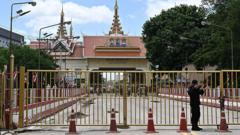In a latest twist in British politics, Prime Minister Keir Starmer's government has reconsidered significant changes to social welfare benefits, shaking the confidence in his leadership as dissent from party members mounts.
Starmer Faces Backlash Over Social Welfare Policy Revisions

Starmer Faces Backlash Over Social Welfare Policy Revisions
Prime Minister's recent about-face on welfare reforms raises questions about his decision-making authority.
On June 27, 2025, Prime Minister Keir Starmer announced a reversal on proposed alterations to pivotal social welfare benefits after facing considerable criticism from within his party. This change follows a pattern of policy retreats, sparking concerns regarding Starmer’s political judgment.
The government had initially aimed to lessen the eligibility criteria for assistance payments for disabled individuals in an effort to cut the UK's increasing welfare expenditure by £5 billion (about $6.9 million). However, mounting opposition resulted in the decision to soften these proposals, suggesting that the upcoming parliamentary vote, anticipated for Tuesday, which previously seemed destined for failure, might secure the necessary support.
Starmer's withdrawal from these welfare reforms is indicative of a series of recent policy reversals, including a previous decision to limit winter fuel support for retirees and a significant shift towards launching a national inquiry into child sexual exploitation—an investigation that Starmer had initially opposed.
The implications of these concessions have triggered debates about how the government will address its budgetary shortfall. Opposition figures predict potential tax hikes, further reductions in government spending, or breaches of previously established borrowing limits as Chancellor of the Exchequer Rachel Reeves grapples with the fallout from these policy changes.
This predicament highlights the challenges faced by Starmer's administration, which, despite enjoying a solid parliamentary majority, finds itself embroiled in a political crisis less than a year post a significant general election victory.





















